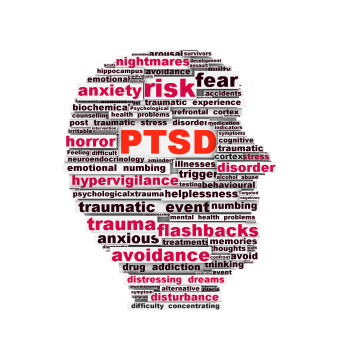One Doctor’s Protocol for the Treatment of Severe PTSD
 Note: The following article discusses “off-label” treatments for the treatment of PTSD or traumatic brain injury, i.e. those which are not FDA-approved for these purposes. In some of these instances, there is no controlled research to support the use of these drugs in patients with PTSD. Thus the ideas noted here cannot be taken as anything more than anecdotal information from personal experience. Patients and physicians must make their own decisions about any of the strategies reported in this or other issues of BNN.
Note: The following article discusses “off-label” treatments for the treatment of PTSD or traumatic brain injury, i.e. those which are not FDA-approved for these purposes. In some of these instances, there is no controlled research to support the use of these drugs in patients with PTSD. Thus the ideas noted here cannot be taken as anything more than anecdotal information from personal experience. Patients and physicians must make their own decisions about any of the strategies reported in this or other issues of BNN.
At a recent scientific conference, Vaishali P. Bakshi, a renowned Canadian psychopharmacologist, shared a novel treatment strategy he has developed for patients with exceptionally profound degrees of post-traumatic stress disorder (PTSD), which, particularly among military veterans, can be compounded by traumatic brain injury.
Treatment options based on placebo-controlled clinical trials are sometimes insufficient for the treatment of seriously ill patients. FDA-approved treatment for PTSD consists of serotonin-selective antidepressants, while exposure therapies (in which the patient is gradually exposed to more of the stimuli that triggered symptoms) are the recommended psychotherapy, but these methods often leave patients highly disabled.
Bakshi’s typical treatment algorithm goes well beyond these treatment guidelines to find solutions for hard-to-treat patients. He first addresses sleep disturbance, which often occurs in PTSD. He suggests the anticonvulsant levetiracetam (Keppra), starting at doses of 150mg per night and increasing to 500–1000mg as tolerated. This highly sedating anticonvulsant not only improves sleep but may also help cognition, since it is structurally similar to other cognitive enhancers such as piracetam. Levetiracetam also decreases the hippocampal hyperactivity associated with some forms of cognitive dysfunction, as we’ve noted before. In order to further enhance sleep effects, Bakshi adds trazodone at 50–150mg per night as needed.
Instead of selective serotonin reuptake inhibitors (SSRIs), Bakshi recommends the selective serotonin and norepinephrine reuptake inhibitors (SNRIs). Among these, he prefers desvenlafaxine (Pristiq) over venlafaxine, as desvenlafaxine has fewer interactions with other drugs. Theoretically, duloxetine (Cymbalta) is another SNRI that could be used.
Another component of Bakshi’s treatment plan is topiramate (Topamax), which can target many comorbidities of PTSD, including alcohol and substance abuse, particularly stimulant abuse. In addition, topiramate has efficacy in anger attacks, which often accompany PTSD.
In patients with ongoing problems with depression and/or cognition, Bakshi adds bupropion (Wellbutrin). Read more
Drug Used for Fluid Retention May Be Useful in Autism
Bumetanide has been used for decades to treat fluid retention in those with heart failure or liver or kidney disease. In the brain, it allows chloride ions to leave cells more easily. Scientists researching pediatric seizures think that reducing the chloride inside brain cells helps GABA neurons’ inhibitory functions work better. This led to speculation that bumetanide could be useful in neonatal epilepsy and autism.
In a 2012 study by French researchers including Eric Lemonnier that was published in the journal Translational Psychiatry, 60 patients aged 3 to 11 who had been diagnosed with autism or Asperger’s syndrome were given either placebo or 1mg of bumetanide daily for 3 months. By the end of the study, the children who received bumetanide showed an average reduction of 5.6 points on the Childhood Autism Rating Scale (CARS), which is assessed from observing behavior during videotaped sessions of children playing with their caregiver and questioning the child’s parents. Children taking placebo showed a reduction of 1.8 points (a statistically significant difference). Clinicians in the study rated almost twice as many children who took bumetanide as having made a significant or a small improvement. Stereotyped behavior and restricted interest were the areas of behavior that seemed to improve most after treatment with bumetanide. Patients with milder autism when the study began tended to improve more than those who started out with more severe symptoms. Symptoms returned to previous levels within a month the study’s end.
Bumetanide’s side effects are well known. It can sometimes cause decreases in potassium in the blood (hypokalemia), so the children’s potassium levels were monitored closely. One child was withdrawn from the study for hypokalemia, which can predispose one to cardiac arrhythmias.


